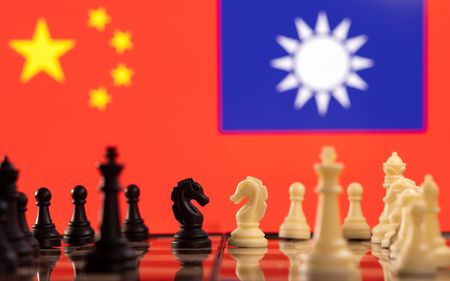 1
1 1
1
TAIPEI (Reuters) -A Chinese uncrewed combat aircraft has flown around Taiwan, the island’s defence ministry said, showcasing Beijing’s ability to attack its fall-back east coast bases, as a U.S. maritime patrol aircraft transited the Taiwan Strait.
China, which views democratically governed Taiwan as its own territory, has increased military pressure on the island over the past three years as it tries to force Taipei to accept its sovereignty claim.
This month, China staged war games around Taiwan after Taiwan President Tsai Ing-wen met U.S. House of Representatives Speaker Kevin McCarthy in Los Angeles.
Taiwan’s defence ministry, in an early Friday update of Chinese military activities over the previous 24 hours, said 19 military aircraft had entered the island’s air defence identification zone.
One of those was a TB-001 drone, which flew around Taiwan, first crossing the Bashi Channel that separates Taiwan from the Philippines, then up the east of Taiwan before crossing back toward the Chinese coast, according to a map provided by the ministry.
Chieh Chung, a military researcher at Taiwan’s National Policy Foundation think tank, said that during a war, China was likely to send the TB-001 to spot targets on the island’s east coast, where Taiwan would shelter reserve forces, as bases there do not face China.
“It will allow the communist’s military’s naval and air forces in the Western Pacific, including air force strike groups or carrier battle groups, to launch attacks” on the east coast, he said.
He added that it was not the first time a Chinese drone has flown around Taiwan, but was most likely to first time it did so entirely within Taiwan’s air defence zone.
Chinese state media has referred to the TB-001 as the “twin-tailed scorpion” and has shown pictures of it carrying missiles, saying it is capable of high-altitude, long-range missions.
China’s air force has flown what it calls “island encirclement” missions with the crewed, nuclear-capable H-6 bomber.
TAIWAN STRAIT MISSIONS
The tensions around Taiwan have alarmed Washington and its allies, which have repeatedly expressed concern at China’s behaviour and called for no forced change in the status quo.
A U.S. Navy P-8A Poseidon maritime patrol and reconnaissance aircraft flew through the Taiwan Strait on Friday, and a senior French lawmaker confirmed a warship from his country had recently transited the sensitive waterway.
The United States, and occasionally its allies, have routinely sent warships and aircraft through the Taiwan Strait in recent years.
The U.S. Navy’s 7th Fleet said the Poseidon flew in international airspace.
“By operating within the Taiwan Strait in accordance with international law, the United States upholds the navigational rights and freedoms of all nations,” it said in a statement. “The aircraft’s transit of the Taiwan Strait demonstrates the United States’ commitment to a free and open Indo-Pacific.”
China’s military said it monitored the aircraft, and accused the United States of provocative behaviour in the strait.
China said last year that it has sovereignty, sovereign rights and jurisdiction over the Taiwan Strait, and said it was “a false claim” to refer to the strait as international waters.
The United States and Taiwan both say China’s position is not correct.
Meeting Tsai at her office in Taipei on Friday, a French lawmaker and former defence minister said sending a warship through the strait showed his country’s commitment to security.
“I want to tell you that our parliament’s view is that the security of Taiwan is an important concern for us and we are encouraging our authorities to stay alert on security in the Strait, as the recent passage of our warship has again demonstrated,” French Senate Vice President Alain Richard said.
He did not say when the sailing happened, and neither the French nor Taiwanese governments has officially confirmed details. Taiwan’s defence ministry said this month it was aware of the transit.
French President Emmanuel Macron recently warned against being drawn into a crisis over Taiwan driven by an “American rhythm and a Chinese overreaction”.
(Reporting by Ben Blanchard; Additional reporting by Yimou Lee; Editing by Robert Birsel and Gerry Doyle)